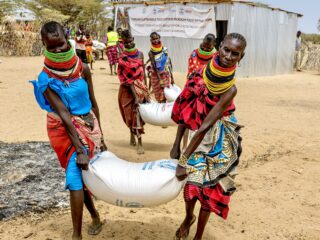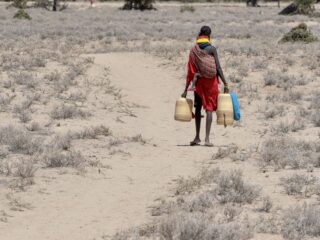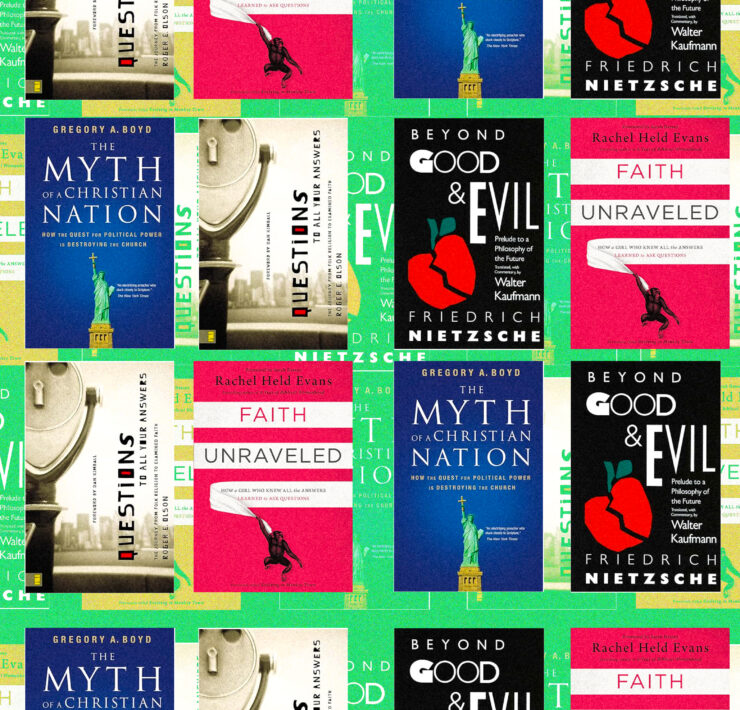
When Russia invaded Ukraine in February, it didn’t just bring pain and turmoil to Eastern Europe. It also sparked a humanitarian crisis that’s impacting the globe.
Together, Russia and Ukraine generate 30 percent of the global wheat supply. And Ukraine itself is the top provider of wheat for the World Food Program, which provides critically needed food to the most impoverished nations in the world.
Russia’s invasion—specifically their targeting of Ukraine’s wheat fields—has left the agricultural supply chain in tatters. The wheat supply to the World Food Program has been all but cut off, leaving tens of millions without food. And even for families that can afford to buy food, wheat prices have surged—increasing by 45 percent in Africa—making food now unattainable for many. The result is an unprecedented catastrophe.

“The world is experiencing its worst hunger crisis of modern time,” Edgar Sandoval Sr., president and CEO of World Vision, told RELEVANT. “There are 49 million worldwide on the brink of starvation, and half of those are children.”
World Vision is the largest distributor of World Food Program aid. We spoke to Sandoval just after he returned from Kenya seeing the frontline impact first-hand.
“It’s putting a significant strain on relationships at home and within the broader community,” Sandoval said. “In the village I visited, you can hear the arguments between husbands and wives and the fights because everybody’s stressed out.”
The rising price of food has made it difficult for families to feed their children. Everything is more expensive, from basic ingredients to necessary nutrients. Families can’t feed their children. Mothers can’t get enough protein to produce proper breast milk to feed their babies. A jar of cooking oil that once cost $16 is now selling for $45 in marketplaces — nearly three times the price as it was before the war began. In a short amount of time, families have been forced to keep up with rising prices or risk losing one of their members. One person is likely dying of hunger every 48 seconds.
Sandoval spoke about a food dispensary he visited where the nutritionists were working around the clock to try and help as many children as possible.
“The nutritionist was telling me that about 40 percent of the children were being diagnosed as severely malnourished. And she said, ‘I just need more. I just need more food packets and these kids, I can get them back. But I need the food. I don’t have enough to go,'” Sandoval said.
In just five months, the amount of children suffering from the severe food crisis has increased by 15 percent. The younger the child, the more likely they are to suffer from malnutrition. One report found that nearly 8 million children across 15 African countries are “at risk of death from severe wasting unless they receive immediate therapeutic food and care” — and that number continues to rise every minute. Rising alongside it are food prices and cost of life-saving supplies. It’s put a significant strain not only on families in the area but also in organizations that are working to help those hit hardest.
“Everything is more expensive,” Sandoval said. “Supply chains are disrupted. And we just don’t have enough funding.”
While the war in Ukraine has brought a new urgency to the need, the hunger crisis in Africa has actually been building for years because of three primary reasons:
- Increased Conflict and Violence: Since Russia invaded Ukraine, 15 million people have been displaced from their homes and forced to seek refuge in a different country. This has put pressure on other nations to not only take in refugees, but also provide proper food and supplies for them.The violence doesn’t just stop in Eastern Europe. East African nations have been experiencing wars within their borders for years that has led to increased instability. This limits organizations abilities to get supplies into the countries where people need it most.
- Extreme and Unpredictable Weather Patterns: While some crises are out of our control, humanity’s mistreatment of the environment and disregard for climate change has resulted in unpredictable weather patterns like droughts or floods. Neither one of those are helpful to small farmers or pastoral communities, which are found throughout African regions. On top of that, nations in Africa are experiencing deadly locust infestations that are eating away and destroying their crops.
- The Global Pandemic: Covid changed livelihoods forever. Markets were shut down for small holder farmers to sell their products. Those who are employed in manufacturing companies or facilities were shut down, leading families to lose their sources of income. And as schools were shut down, teens were left to their own devices which has led to a rise in teen pregnancy in the East African region, which means there’s more mouths to feed.

Photo Credit: World Vision
“It’s a challenging context where only one thing seems to be on the rise: that is hopelessness,” Sandoval said. “Families and communities have been stretched beyond what they can absorb reasonably without more support.”
Since the World Food Program’s supply of Ukrainian wheat has totally been cut off, the only option to provide food to nations in need is for the WFP to purchase wheat from other countries, many times at 30-45 percent higher prices. Somalia alone used to import 92 percent of its wheat from Russia and Ukraine. Now, food banks and government agencies are stretching their money as much as they can to purchase supplies for higher prices from other places. If they’re able to purchase food, it’s never enough to properly feed their family, and it leaves them with little to no money left for other expenses.
If you want to help save lives in this crisis, donating to organizations working on the front lines, like World Vision, can go a long way.
“There are some things that we will do longer term,” Sandoval said, “but right now, job number one is to save those precious lives.”
























